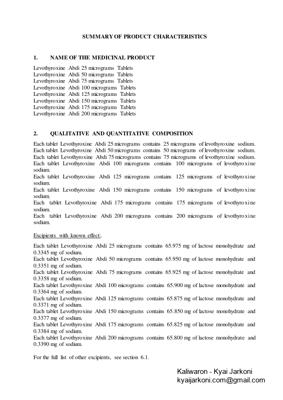Levothyroxine Abdi 200 micrograms Tablets. 2. QUALITATIVE AND QUANTITATIVE COMPOSITION. Each tablet Levothyroxine Abdi 25 micrograms contains 25 micrograms
11 pages
127 KB – 11 Pages
PAGE – 1 ============
SUMMARY OF PRODUCT CHARACTERISTICS 1. NAME OF THE MEDICINAL PRODUCT Levothyroxine Abdi 25 m icrogram s Tablets Levothyroxine Abdi 50 m icrogram s Tablets Levothyroxine Abdi 75 m icrogram s Tablets Levothyroxine Abdi 100 m icrogram s Tablets Levothyroxine Abdi 125 m icrogram s Tablets Levothyroxine Abdi 150 m icrogram s Tablets Levothyroxine Abdi 175 m icrogram s Tablets Levothyroxine Abdi 200 m icrogram s Tablets 2. QUALITATIVE AND QUANTITATIVE COMPOSITION Each tablet Levothyroxine Abdi 25 m icrogram s contains 25 micrograms of levothyroxine sodium. Each tablet Levothyroxine Abdi 50 m icrogram s contains 50 micrograms of levothyroxine sodium. Each tablet Levothyroxine Abdi 75 m icrogram s contains 75 mic rograms of levothyroxine sodium. Each tablet Levothyroxine Abdi 100 m icrogram s contains 100 micrograms of levothyroxine sodium. Each tablet Levothyroxine Abdi 125 m icrogram s contains 125 micrograms of levothyroxine sodium. Each tablet Levothyroxine Abdi 150 m icrogram s contains 150 micrograms of levothyroxine sodium. Each tablet Levothyroxine Abdi 175 m icrogram s contains 175 micrograms of levothyroxine sodium. Each tablet Levothyroxine Abdi 200 m icrogram s contains 200 micrograms of levothyroxine sodium. Excipients with known effect: . Each tablet Levothyroxine Abdi 25 micrograms contains 65.975 mg of lactose monohydrate and 0.3345 mg of sodium. Each tablet Levothyroxine Abdi 50 micrograms contains 65.950 mg of lactose monohydrate and 0.33 5 1 mg of sodium. Each tablet Levothyroxine Abdi 75 micrograms contains 65.925 mg of lactose monohydrate and 0.33 5 8 mg of sodium. Each tablet Levothyroxine Abdi 100 micrograms contains 65.900 mg of lactose monohydrate and 0.3364 mg of sodium. Each tablet Levothyroxine Abdi 125 micrograms contains 65.875 mg of lactose monohydrate and 0.3371 mg of sodium. Each tablet Levothyroxine Abdi 150 micrograms contains 65. 850 mg of lactose monohydrate and 0.3377 mg of sodium. Each tablet Levothyroxine Abdi 175 micrograms contains 65.825 mg of lactose monohydrate and 0.3384 mg of sodium. Each tablet Levothyroxine Abdi 200 micrograms contains 65.800 mg of lactose monohydrat e and 0. 3390 mg of sodium. For the full list of other excipients, see section 6.1.
PAGE – 2 ============
3. PHARMACEUTICAL FORM Tablet Levothyroxine Sodium 25 mcg Tablet s are Levothyroxine Sodium 50 mcg Tablet s are side. Levothyroxine Sodium 75 mcg Tablet s are Levothyroxine Sodium 100 mcg Tablet s are round and white tablets debossed on one side with Levothyroxine Sodium 125 mcg Tablet s are round and white tablets debossed on one side with Levothyroxine Sodium 150 mcg Tablet s are round and w hite tablets debossed on one side with Levothyroxine Sodium 175 mcg Tablet s are round and white tablets debossed on one side with Levo thyroxine Sodium 200 mcg Tablet s are round and white tablets debossed on one side with The tablet can be divided into equal doses. 4. CLINICAL PARTICULARS 4.1 Therapeutic indications Levothyroxine Abdi 25 200 m icrogram s : T reatment of benign goiter (thyroid enlargement) with euthyroid function Prophylaxis of recurrent goiter after resection of the goiter with euthyroid function, depending on the postoperative hormonal status Thyroid hormone replacement in hypothyroidism Suppression treatment in thyroid malignancy Levothyroxine Abdi 25 100 m icrogram s : Concomitant supplementation during anti – thyroid drug treatment of hyperthyroidism Levothyroxine Abdi 100/150/200 m icrogra m s : Diagnostic use for t hyroid suppression test
PAGE – 3 ============
4.2 Posology and method of administration Posology In order to treat each patient individually according to needs of the patient, tablets with a grad ually – increasing content of 25 to 200 micrograms of levothyroxine sodium are available, so generally only one tablet should be taken daily. The dosing recommendation s provided in this document are for guidance purposes only. Individual daily dose should be determined by laboratory tests and clinical examina tion s . Since some patients who are undergoing treatment have elevated T4 and fT4 levels, the determination of the basal serum concentration of the thyro id – stimulating hormone (TSH) is a more reliable basis for the further therapeutic approach. Treatment wi th thyroid hormones should be started at a low dose and gradually increased every 2 to 4 weeks in order to reach to the targeted dose. Elderly population: In patients with coronary heart disease and in patients with severe or long – existing hypothyroidism, treatment with thyroid hormones should be started with special care. At first, a low initial dose (e . g . , 12.5 micrograms/day) should be administered , and then it should be increased slowly and at longer intervals (e . g . , a gradual dose increases of 12.5 mic rograms every 14 days) with frequent control of thyroid hormone levels. Dosage below the dose required for complete substitution and therefore insufficient to fully normalize TSH value must be considered here. Experiences have show n that a lower dose is su fficient even with low body weight and with a large nodular goiter. Paediatric population: In newborns and children with congenital hypothyroidism requiring rapid substitution, an initial dose of 10 to 15 micrograms/kg of body weight per day is recommended for the first 3 months. Afterwards, the dose should be adjusted based on individual clinical findings, and thyroid hormone and TSH levels. Indication Recommended dosage (levothyroxine sodium microgram /day) Benign goiter with euthyroid function 75 200 Prophylaxis of recurrent goiter after resection of the goiter with euthyroid function 75 200 Thyroid hormone replacement in Hypothyroidism in adults: Initial dose Maintenance dose 25 50 100 200 Thyroid hormone replacement in hypothyroidism in children: Initial dose 12,5 50 100 150 micrograms/m 2 b ody surface
127 KB – 11 Pages
